Cloud Storage Camera: Ultimate Guide 2025
Choosing Your Ideal Cloud Storage Camera System
A cloud storage camera is a modern security solution that uploads video footage directly to secure internet servers, eliminating the need for a local recording device like an NVR or DVR. Unlike traditional systems that store video on a vulnerable local hard drive or SD card, a cloud camera keeps your footage safely off-site. This provides key benefits like the ability to access video from anywhere, a secure backup that’s safe from theft or damage, and the power to easily share clips with law enforcement.
For South Florida homeowners seeking reliable security, a cloud storage camera system offers a powerful, accessible solution. Traditional systems can be complex and their physical storage can be lost or damaged. Cloud cameras provide peace of mind through easy remote access and secure footage.
As Brad Besner, founder of Techpro Security Products, I’ve spent years helping people secure their properties. My experience with advanced perimeter protection and AI analytics gives me unique insight into what makes a cloud storage camera truly effective for home and business security.
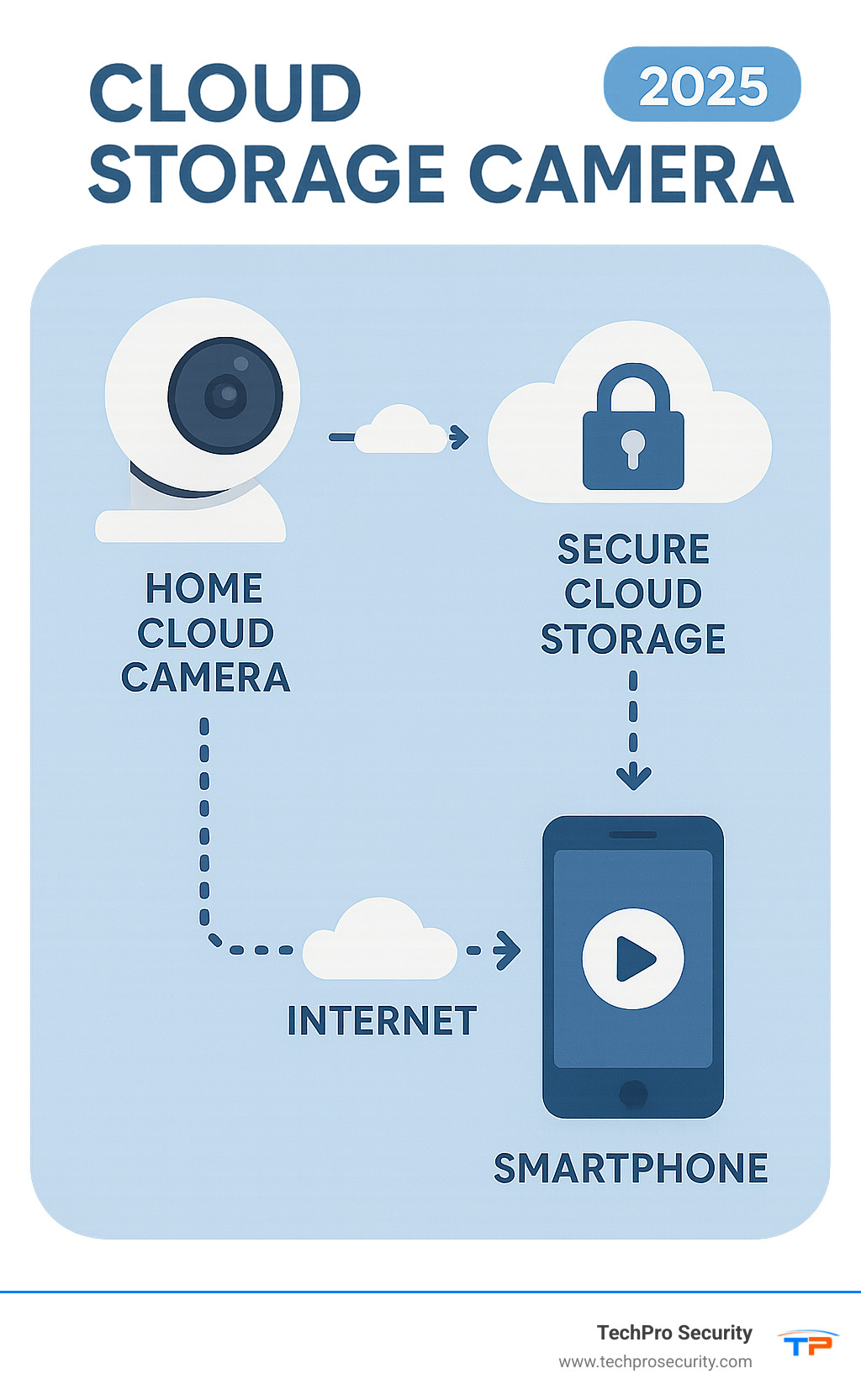
What is a Cloud Storage Camera and Why is it a Game-Changer?
Instead of storing recordings on a local SD card or a recorder in your closet, a cloud storage camera instantly sends video over the internet to a secure, remote server. This is a fundamental shift from traditional security systems that relied on local storage (NVRs, DVRs), which could be stolen, damaged, or destroyed.
A cloud storage camera flips the script. By storing footage off-site, it protects your evidence from physical threats at your property, like theft, fire, or flood. This provides incredible data redundancy and a vital layer of protection against tampering or loss.
The best part is remote accessibility. You can view live or recorded video anytime, anywhere, from an app on your smartphone, tablet, or computer. This convenience and connectivity are cornerstones of modern security. To learn more about controlling your cameras from afar, see our guide on Remote Surveillance Camera Monitoring. The cloud also handles storage management, so you don’t have to worry about running out of space. For more on this, visit our page on Cloud Backup and File Storage.
The Core Benefits of Cloud Video Surveillance
Cloud video surveillance offers peace of mind that traditional systems can’t match. Key advantages include:
- Unbeatable Footage Protection: With local storage, video is at risk from theft, damage, or malfunction. With cloud storage, your video is safe even if the camera itself is stolen or destroyed. The evidence is already securely stored off-site, protected from physical threats.
- Access Anywhere: Check in on your camera feeds anytime, from any internet-connected device, whether you’re at work or on vacation.
- Flexible Scalability: Unlike local systems with fixed storage, cloud solutions grow with you. Add more cameras or increase storage easily without needing new hardware.
- Easy Sharing: Quickly share important video clips with family, neighbors, or law enforcement directly from your app. For more on professional monitoring, explore our Video Monitoring Service.
Local Storage vs. Cloud Storage: A Quick Comparison
Choosing between local and cloud storage is a key decision. Here’s a quick breakdown:
| Feature | Local Storage (e.g., SD Card, NVR/DVR) | Cloud Storage (e.g., CloudPlay, Videoloft) |
|---|---|---|
| Storage Location | On-site, inside the camera or a separate recording box | On remote servers, accessed via the internet |
| Accessibility | Mostly on-site; some remote viewing possible if set up | Anywhere, anytime access with an internet connection |
| Physical Security | Can be stolen, damaged (by fire, flood), or tampered with | Highly secure, off-site, protected from physical threats to your property |
| Storage Limits | Fixed capacity (e.g., 512 GB SD card, 1 TB NVR) | Very flexible, often with “unlimited” or large storage plans |
| Cost | Higher upfront cost for NVR/DVR; SD cards are cheap; no monthly fees | Usually lower upfront camera cost; ongoing monthly/annual subscription fees |
| Internet Dependency | Records even offline; internet needed only for remote viewing | Needs stable internet to record and for you to access |
| Privacy | More control, as data stays on your property | Relies on the provider’s security and privacy rules |
| Bandwidth | Very little internet bandwidth used for recording | Needs good internet upload speed, especially for continuous recording |
Local storage has a lower ongoing cost and keeps data on-site, but it’s physically vulnerable. If the device is stolen or damaged, your evidence is gone. Cloud storage excels with data redundancy and remote accessibility, but it requires a stable internet connection and typically involves subscription models.
Many find a hybrid approach offers the best of both worlds, using local storage (SD card or NVR) for continuous recording while backing up important events to the cloud. This ensures you have a local copy if the internet fails and a secure off-site backup for complete peace of mind. We often recommend these smart hybrid solutions to our South Florida clients to ensure constant protection.
Key Features to Look For in Your Surveillance System
Choosing the right cloud storage camera means evaluating the core features that define its performance and value.
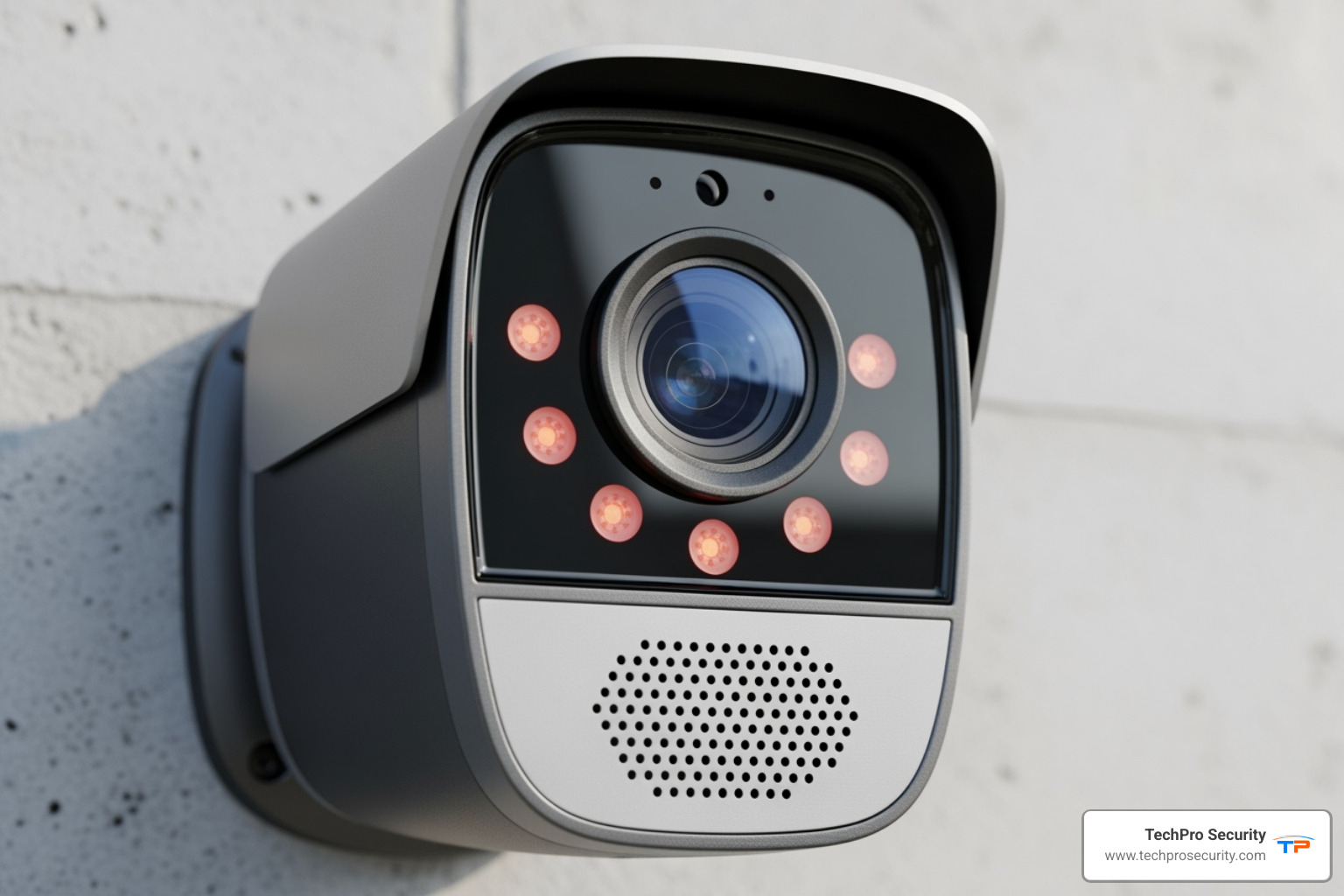
Key components like the lens, microphone/speaker for two-way talk, and night vision sensors work together to create a comprehensive security solution. Understanding what makes each feature effective will help you choose the best camera for your needs.
Video Quality and Viewing Capabilities
Good video quality is essential. We recommend starting with at least HD 1080p resolution for clear images that can identify faces and license plates. While 2K or 4K resolution offers even more detail, be aware that it requires more internet bandwidth and storage space.
Night vision is critical for 24/7 security. While standard infrared provides clear black-and-white footage, color night vision technology is a game-changer, capturing full-color images in very dim light. This can help identify crucial details like the color of a car or clothing at night. For top-tier low-light performance, consider our starlight-security-camera options.
For maximum coverage, Pan-Tilt-Zoom (PTZ) cameras allow you to remotely control your viewing area, while digital zoom lets you magnify parts of the image.
Smart AI Detection and Alerts
Modern cloud storage cameras use smart AI to reduce false alarms. Instead of getting alerts for every blowing leaf, AI-powered features focus on what matters:
- Person and Vehicle Detection: The camera learns to recognize human shapes and cars, so you’re only notified of relevant activity.
- Package Detection: Get alerts when a package is delivered and, more importantly, when it’s removed.
- Advanced Features: Some systems offer facial recognition to identify familiar faces and reduce false alerts by up to 90%.
Customizable activity zones let you define specific areas to monitor, like a doorway, while ignoring public sidewalks. When a relevant event occurs, smart alerts are sent instantly to your smartphone. For help connecting your cameras, see our guide on Connecting Your Security Cameras to Your Smartphone.
Camera Hardware and Durability
The physical build of your cloud storage camera determines its longevity, especially in South Florida’s challenging weather. Outdoor cameras must be durable, with weatherproof ratings like IP65 or IP66 to withstand rain, heat, and humidity.
Power and connectivity options are also key:
- Wired (PoE): Power over Ethernet offers the most reliable connection, with power and internet delivered through a single cable. This is ideal for continuous recording.
- Wire-free: Battery-powered cameras offer incredible installation flexibility and are perfect for renters or locations where running cables is difficult. Batteries can last for months depending on usage.
- Solar Power: For outdoor wire-free cameras, a small solar panel can provide continuous charging, eliminating battery maintenance.
Matching the camera to your environment is crucial. Explore our Wireless Security Camera System options for flexible and reliable solutions.
Understanding Security, Privacy, and Costs
When considering a cloud storage camera, it’s natural to have questions about security, privacy, and cost. You’re trusting a service with your home’s video footage, so you need to know it’s safe and understand the fees involved.
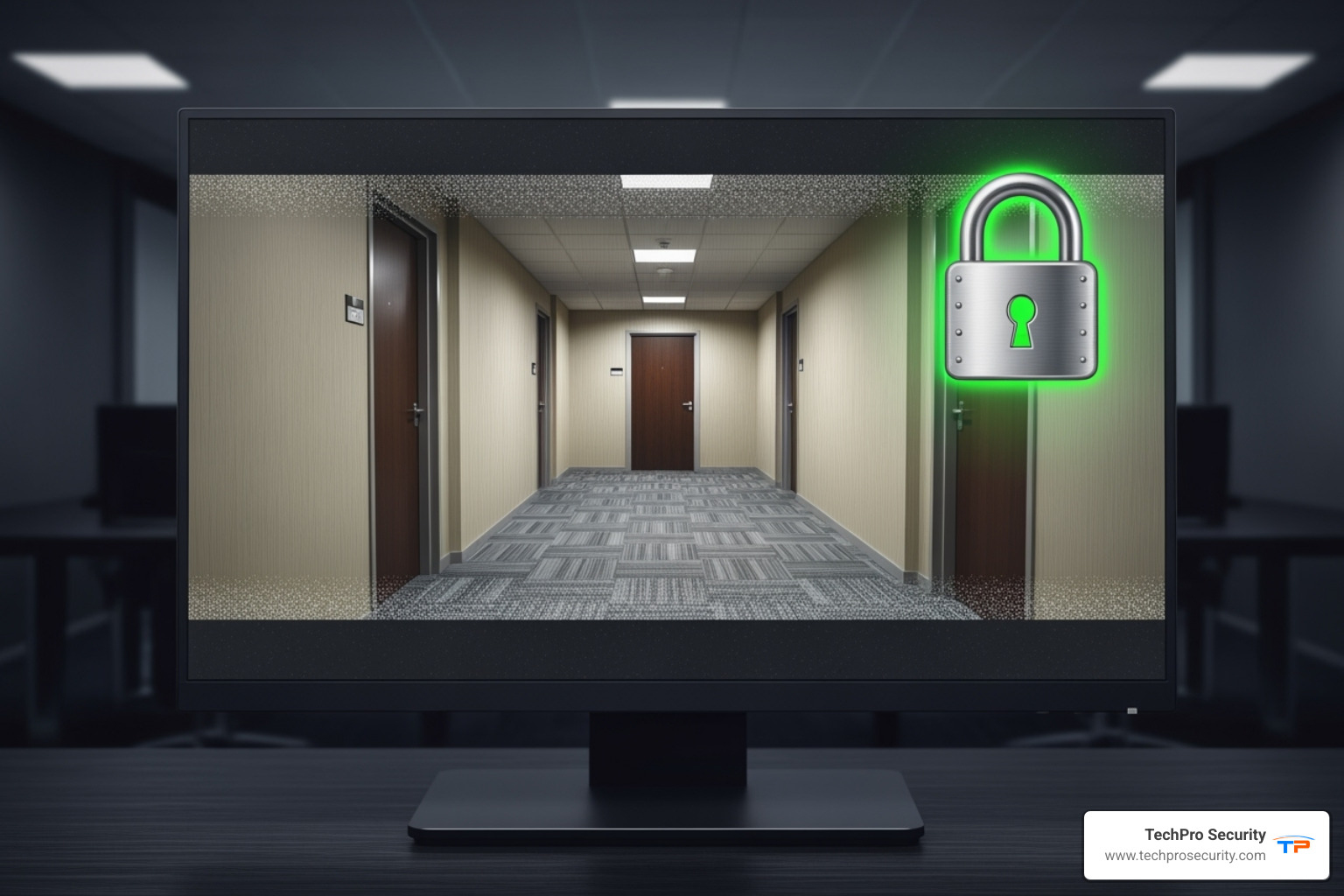
How Your Footage is Kept Safe and Private
Reputable cloud providers build multiple layers of protection for your video. Your footage is encrypted in transit as it travels from your camera to the cloud, making it unreadable to outsiders. Once it arrives, it’s protected by encryption at rest, scrambling the data on the server with powerful 256-bit encryption.
This “cloud” consists of highly secure data centers, like those from Amazon Web Services (AWS), which feature strict physical and digital security and meet top industry standards (ISO27001, SOC 2). You can learn more about their resilience by reading about Data durability explained by AWS.
You remain in control with user access controls and two-factor authentication (2FA), which requires a second code from your phone to log in, even if someone steals your password. We always recommend enabling 2FA. Some cameras also offer privacy modes, like a physical shutter or an electronic setting to disable recording when you’re home. These measures make your data far safer in the cloud than on a vulnerable local device.
Decoding Cloud Storage Subscription Plans
The convenience of cloud storage cameras often comes with a recurring subscription fee. Understanding these plans is key to managing your budget and getting the features you need.
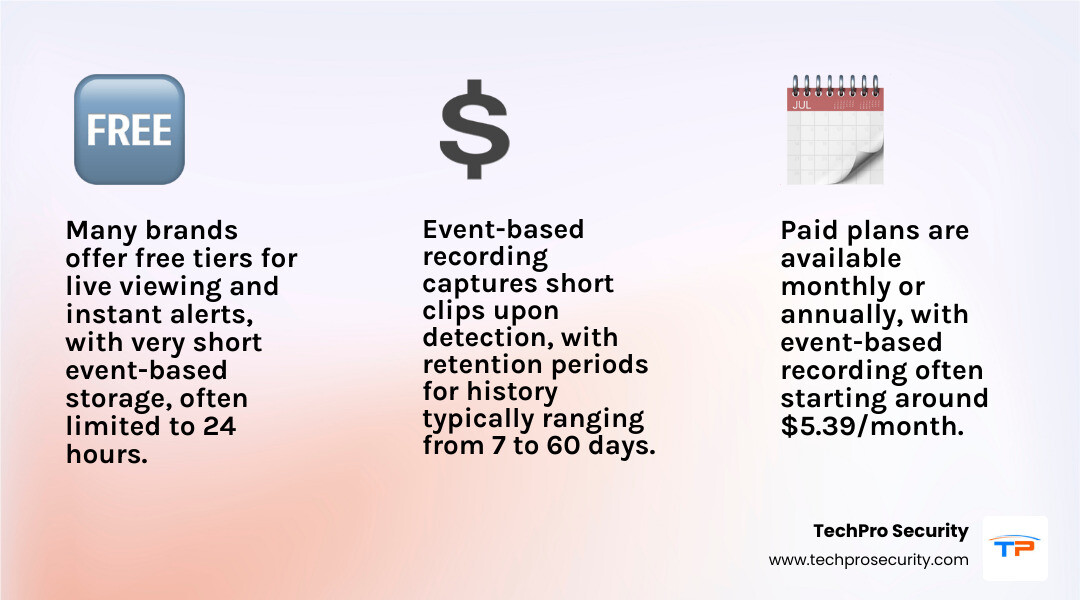
Many brands offer a free tier with basic live viewing and alerts, plus free trials (often 30 days) for paid features. Paid plans are typically cheaper if you pay annually.
- Event-Based Recording: This is the most common and affordable option (starting around $5-$7/month). The camera records short clips only when it detects motion or a person, saving bandwidth. Plans typically store clips for 7 to 60 days.
- Continuous Video Recording (CVR): For 24/7 recording, CVR plans are available. They require more bandwidth and a constant power source, with prices often starting around $10/month for 30+ days of storage.
Pay close attention to the video history duration (how long footage is saved) and any camera limits per plan. Some plans cover a single camera, while others cover multiple cameras at one location. Always review the details of pricing tiers and retention policies to find the plan that best fits your security needs and budget.
Installation, Integration, and Ideal Use Cases
A major appeal of cloud storage cameras is their ease of use, designed to fit seamlessly into our connected lives.
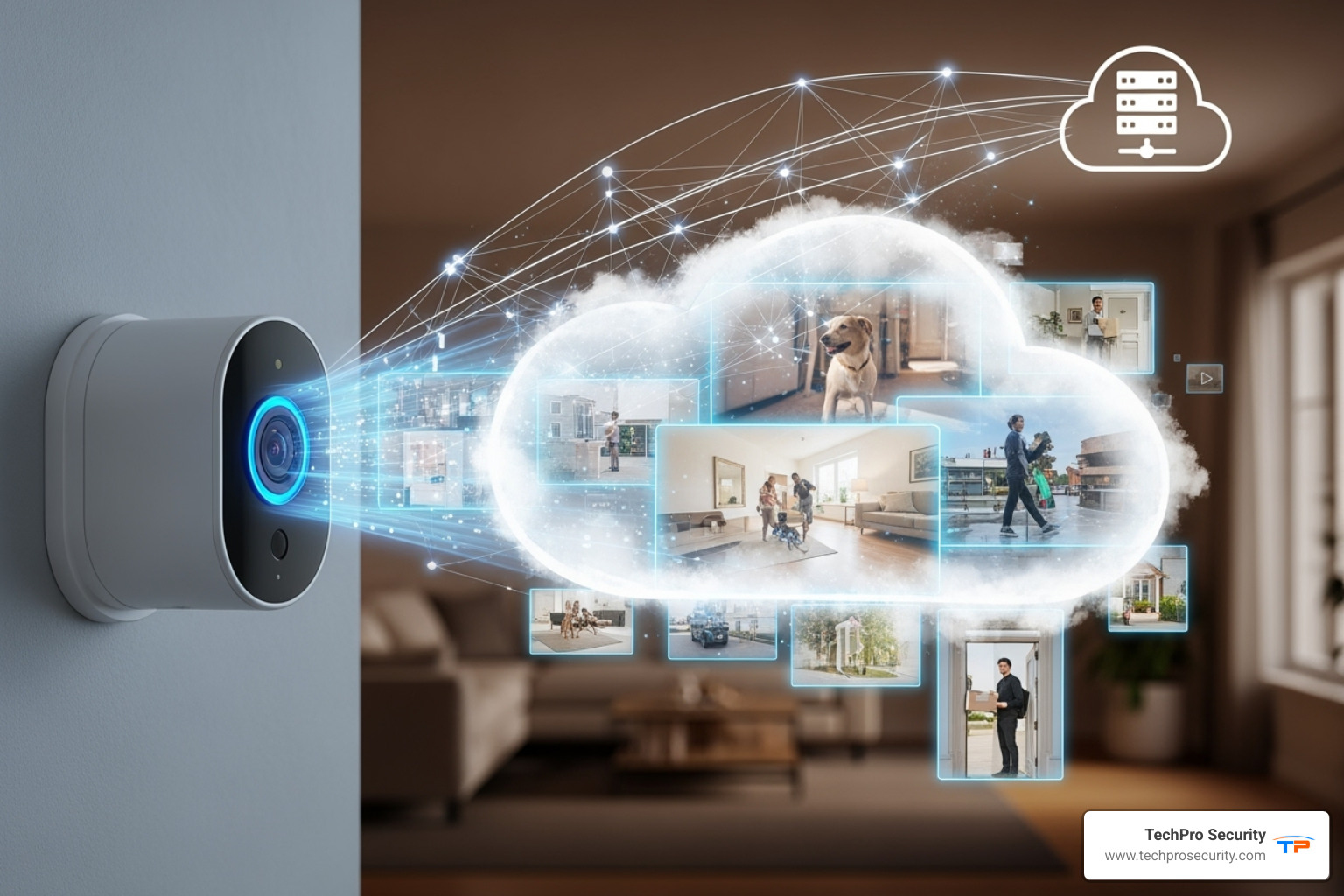
Setup and Integration with Your Smart Home
Many cloud storage cameras offer a simple plug-and-play setup. You typically connect the camera to your Wi-Fi and link it to your account via a mobile app. While many users prefer a DIY setup, professional installation is also an option for guaranteed peace of mind.
These cameras often integrate with smart home ecosystems like Amazon Alexa and Google Assistant, allowing you to view a live feed on a smart display with a simple voice command. This integration can trigger other smart devices, like turning on lights when motion is detected. Managing your system from your phone is incredibly convenient; learn more in our guide on Using Your Smartphone to Manage Your Home Security System.
Who Benefits Most from Cloud Surveillance?
The flexibility of cloud storage cameras makes them a great fit for many situations:
- Residential Users: Homeowners and renters can monitor their property, check on pets, and secure package deliveries, all while away from home.
- Small Business Owners: An affordable and easy way to deter theft, monitor daily operations, and ensure security without being on-site.
- Multi-Site Businesses: Manage cameras across multiple locations from a single, centralized platform, simplifying operations. We assist many South Florida businesses with their Multi-Site Video Surveillance needs.
- Remote Locations: Construction sites or other areas without robust internet can use 4G/5G-enabled cloud cameras for essential surveillance where wired options aren’t feasible.
If you value off-site backup, remote access, and a scalable system, a cloud storage camera is an excellent choice.
Important Considerations and Potential Limitations
While cloud storage cameras offer incredible benefits, it’s important to understand their dependencies and potential limitations to make the best choice for your needs.
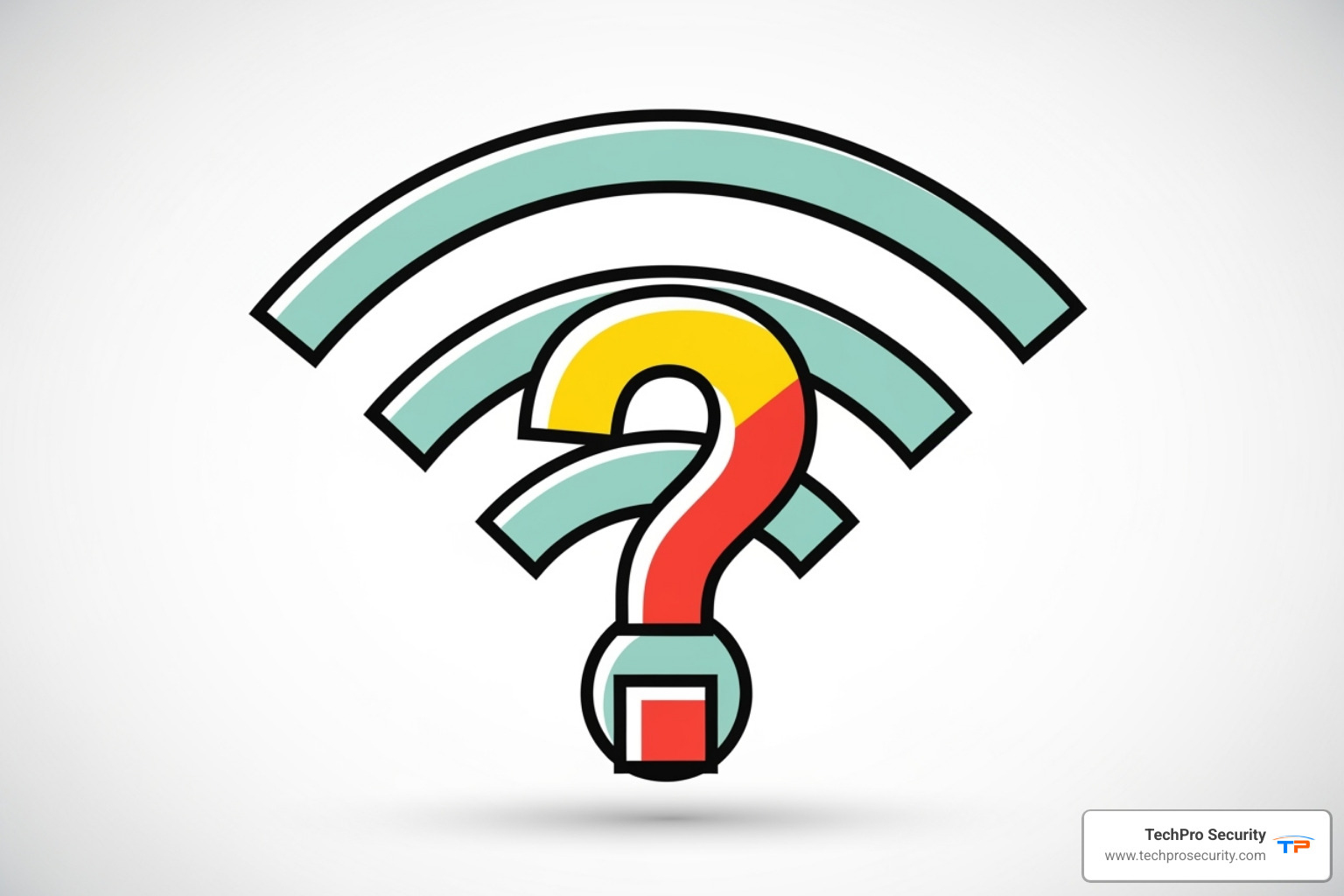
The Critical Role of Your Internet Connection
Your internet connection is the most critical factor for a cloud storage camera. Since footage is streamed to the cloud, a stable and fast connection is essential. Your camera is constantly uploading data, so focus on your plan’s upload speed. A single 1080p camera needs at least 1-2 Mbps of upload speed while streaming, with more required for multiple cameras or 4K resolution.
This constant streaming consumes bandwidth. Continuous Video Recording (CVR) uses a significant amount of data, which could be an issue if your internet plan has data caps. Furthermore, if your internet goes down, your camera cannot send footage to the cloud, potentially creating gaps in your security record. This is why hybrid solutions that combine cloud access with local backup are so valuable.
Choosing the right cloud storage camera for business
Businesses have security needs that often go beyond a typical home camera. For commercial use, we focus on:
- Commercial-Grade Features: This includes robust hardware and advanced AI like Smart Video Search or License Plate Recognition.
- Scalability: The system must support numerous cameras across multiple sites, all managed from one platform.
- User Permissions: Granular control is needed to define who can view specific cameras or access footage.
- Centralized Management: A single dashboard to manage all cameras, users, and settings is vital for efficiency.
- Regulatory Compliance: For certain industries, cloud providers must meet security standards and offer specific video retention periods to satisfy legal requirements.
Is a hybrid cloud storage camera system right for you?
For many, a hybrid cloud storage camera system is the ideal solution. It combines the best of both local and cloud storage, mitigating the limitations of each.
With local backup (via an SD card or NVR), your system continues recording even if your internet connection fails. This creates powerful redundancy: your footage is safe from physical threats in the cloud and protected from internet outages with a local copy. Professional hybrid systems can ensure you have a complete, uninterrupted record, no matter what. At TechPro Security, we frequently recommend hybrid solutions to our South Florida clients for comprehensive, worry-free protection.
Frequently Asked Questions about Cloud Storage Cameras
It’s natural to have questions when exploring new security technology. Here are some of the most common inquiries we receive about cloud storage cameras.
Can I use a cloud camera without a subscription?
Yes, for most cloud storage cameras, you can access basic features like live video streaming and motion alerts without a monthly fee. However, a subscription plan is almost always required for storing, reviewing, and sharing recorded video clips. These plans provide a secure, off-site archive of your footage and often open up advanced AI features. Some cameras offer limited local recording to an SD card as an alternative, but this lacks the off-site security of the cloud.
How much internet bandwidth does a cloud camera use?
Bandwidth usage depends on video resolution (1080p, 4K), frame rate, and the amount of motion recorded. As a general guide, a single 1080p camera needs at least 1-2 Mbps of upload speed while actively streaming. It’s crucial to check your internet plan’s upload speed, not just its download speed, to ensure your connection can support your cameras without slowing down your other online activities.
Is cloud storage more secure than local storage?
In many vital ways, cloud storage is more secure than local storage. Local devices like an NVR or SD card are vulnerable to physical threats. An intruder could steal or damage the device, or a fire or flood could destroy it, resulting in a total loss of evidence. Cloud storage sends your footage off-site to highly secure, encrypted data centers. This means that even if your camera is stolen or your property is damaged, your video evidence remains safe and accessible from anywhere.
Conclusion
Navigating cloud storage cameras is much simpler when you focus on what matters: reliable performance, robust security, and seamless remote access. These systems represent a major leap forward from traditional local storage, offering peace of mind that your video evidence is safe off-site, even if your camera is stolen or damaged.
With features like crystal-clear HD video, smart AI detection that minimizes false alerts, and durable hardware, there’s a cloud solution for every need. While a stable internet connection and a subscription plan are typical requirements, the benefits of secure, accessible, and scalable surveillance are undeniable for most users.
Here at TechPro Security, we pride ourselves on being your go-to security partner in South Florida. Our experienced team doesn’t just sell cameras; we craft custom security systems custom to your unique needs. We provide expert solutions and professional security camera installation to ensure your property is protected reliably and affordably. Let us help you find and set up the ideal cloud storage camera system for your home or business. You deserve that peace of mind!

